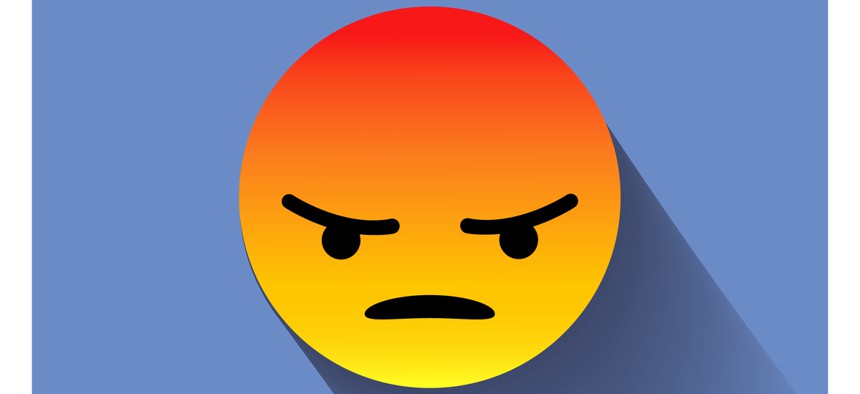The Coalition Out to Kill Tech as We Know It

solomon7/Shuterstock.com
With enemies like these, the industry is going to need some friends.
In October 2016, then-President Barack Obama hosted a miniature version of the blowout tech conference South by Southwest, which the White House called South by South Lawn. Obama, as The New York Times put it at the time, had “brought Silicon Valley to Washington.” He even hinted that if he hadn’t been president, he might have become a venture capitalist. “The conversations I have with Silicon Valley and with venture capital pull together my interests in science and organization in a way I find really satisfying,” he said.
My, how times change! Most American politicians would not be caught consorting so openly with the technology industry these days. And now that Big Tech lacks top cover, government agencies are moving in. According to new reports, Google and Apple face deeper investigation by the Department of Justice, while the Federal Trade Commission takes on Amazon and Facebook.
At a broad ideological level, two things have happened. First, the idea of cyberspace, a transnational, individualistic, largely unregulated, and free place that was not exactly located in any governmental domain, has completely collapsed. Second, the mythology of tech as the carrier of progress has imploded, just as it did for the robber barons of the late 19th century, ushering in the trust-busting era. While Big Tech companies try to establish a new reason for their privileged treatment and existence (hint: screaming “CHINA!”), they are vulnerable to attacks on their business practices that suddenly make sense.
But these changes did not occur in the ether among particles of discourse. Over the past three years, an ecosystem of tech opponents has emerged and gained strength. Here’s a catalog of the coalition that has pulled tech from the South Lawn into the trenches.
Angry Conservatives: The biggest change, of course, came with the 2016 campaign and the ultimate election of Donald Trump. Though Trump played the social-media game with tremendous success, conservatives criticized the platforms during the campaign and have continued to do so throughout the past two and a half years. Most recently, the president announced that he is collecting reports of social-media grievances. There has been a steady drumbeat over the same time frame of stories about tech companies’ left-leaning workforces, which conservatives have spun into a fable about how they are being suppressed. The evidence is thin, but it seems plausible to most people who believe that the platforms censor political viewpoints.
Disillusioned Liberal Tech Luminaries: Alongside the conservative-outrage machine, the biggest body blows that the tech industry has taken have come from disillusioned liberals who worked for those companies. While their specific critiques vary, most of them feel that the platforms aided and abetted the election of President Trump—that is to say, roughly the opposite of the conservative critique above. Many have come to expand their criticisms to the basic mechanisms of the technology industry, from the former Googler Tristan Harris, who works on “Time Well Spent,” to the Facebook co-founder Chris Hughes, who has called for the government to break up the company.
Antitrust Theoreticians: The version of antitrust regulations that emerged in the 20th century held that consumer prices had to rise in order for monopolistic conditions to cause harm. That framing protected Big Tech companies such as Google and Facebook, which give away their products to users. How can there be consumer harm if consumers are paying $0.00? But a new wave of antitrust scholars, now centered at the Open Markets Institute, has argued that this view is outdated because free services can still be harmful to societies. It’s opened the door to new attacks on the market power of Big Tech, and it’s already gained adherents.
Democratic Presidential Candidates: Headlined by Senator Elizabeth Warren, Democratic presidential contenders have proved ready to tussle with Big Tech. Drawing on the new antitrust doctrine, Warren has argued for breaking up the Big Tech firms “to restore the balance of power in our democracy, to promote competition, and to ensure that the next generation of technology innovation is as vibrant as the last.”
Rank-and-File Tech Workers: For years and years, tech companies very rarely leaked. Workers were generally pretty happy, and corporate cultures discouraged talking with outsiders. That’s changed. Now all kinds of tech workers with different agendas—from James Damore types to anti-sexual-harassment campaigners to union organizers—have begun to talk with the press, publicly or privately. The pressure has led to important internal reforms, but has also opened the companies up to new political attacks from a range of directions. All the leaks have eroded the sense of impenetrability that used to surround operations such as Google.
Traditional Democratic Corporate Reformers: Reining in corporate power has long been part of most Democratic politicians’ agenda. But now that zeal is often directed not just at Wall Street or automakers, but also at tech companies. In his position as the chairman of the House Energy and Commerce Committee, Congressman Frank Pallone of New Jersey has repeatedly battled tech-company executives who have testified before him. He’s a traditional Democratic establishment force, an ally of House Speaker Nancy Pelosi, and clearly sees the tech industry as the kind of corporate power that needs to be reined in, starting perhaps with new privacy regulations. “We’ve been talking about it for years, yet nothing has been done to address the problem,” Pallone said at a February hearing. “It’s time that we move past the old model that protects the companies using our data and not the people.”
Privacy Advocates: It would be hard to argue that privacy advocates such as the Electronic Frontier Foundation have had too big of an impact on tech companies, even after the Edward Snowden revelations gave them far more ammunition than they had in years past. Just look around at the data every person on Earth seems to be leaking. The activists remain in the background, pushing for reforms and calling out tech-industry lobbying. Their political alignments might prove difficult to pin down, however, as more muscular government involvement runs counter to the foundational principles of most early internet-privacy proponents.
European Regulators: Nobody has been harder on Big Tech than European regulators, who caused quite a ruckus with their General Data Protection Regulation (GDPR). However, the jury is still out on what the ultimate impact of the GDPR might be on tech firms and everyday users. Europeans have more control, but Big Tech companies might be the real winners (something tech companies have been whispering about many regulations). That said, it’s hard to imagine that the Europeans are done battling American tech companies’ dominance in their lives.
The Media Industry: Having had its lunch eaten, its lunch money taken, and its person shoved into a toilet and a locker by Big Tech, the media industry has begun to fight back. Across the board, the longtime frenemy relationship that most publishers tried to maintain with the Big Tech companies has soured. One thing to watch: With the Facebook wave receding and Google solidifying its control over traffic, the media industry might start to find some love in its heart for Google, while maintaining its open season on Facebook.
The Telecom Industry: Comcast, Verizon, and AT&T might not be the most popular companies in the world, but the old-line telecoms know that Big Tech is their most important competitor. After years of losing regulatory battles, they’ve begun to claw their way back. With the banner of mobile innovation now passing to 5G, it wouldn’t be shocking to see them ramp up their efforts against the platforms that use their networks.
Scholarly Tech Critics: The technology industry has long had skeptics in the academy, but over the past five years, those researchers have landed many more blows, from many different angles. They’ve exploded myths, coined new language for problems, and created rallying cries for those inside and outside the industry. Cataloging them all would be impossible, but this sample gets at the breadth of the critiques: Shoshana Zuboff’s The Age of Surveillance Capitalism; Evgeny Morozov’s To Save Everything, Click Here; Zeynep Tufekci in The New York Times; Tim Wu’s The Attention Merchants; Cathy O’Neil’s Weapons of Math Destruction; Siva Vaidhyanathan’s anti-paeans to Google and Facebook; Frank Pasquale’s The Black Box Society; Safiya Umoja Noble’s Algorithms of Oppression; Sherry Turkle’s Reclaiming Conversation; Malkia Cyril’s powerful essays; and Jean Twenge’s alarming work on youths and their relationship to technology.
Apple: Of the Big Tech companies, Apple is the one that has the most at stake in the regulatory battles. On the one hand, it needs the other giants to produce the apps that make an iPhone worth buying. On the other hand, anything that reduces its perceived value—such as, perhaps, corporate or government surveillance—is bad. Apple can take the moral high ground in some ways because it doesn’t use data in the same way as surveillance-capitalism companies such as Google and Facebook, as Zuboff points out. And it has now taken to highlighting its more privacy-protective approaches and building new ones, which calls attention to the mountains of data its rivals use more intensively.
Oracle and Other Business-Software Companies: Oracle has long been a Google enemy, in part because Google gives away the kinds of products that Oracle sells to big companies and governments. (They’re also locked in an ugly lawsuit over software copyrights.) The company has run a particularly hard-hitting and effective operation called the Google Transparency Project out of the Campaign for Accountability, which has traditionally gone after Republicans for ethical violations. The Transparency Project, which is funded by Oracle and other Google rivals, drew massive attention to Google’s remarkable funding of scholars and academics.
Yelp and Other Consumer-Protection Organizations: Google has also drawn the ire of other competitors, which are mad at Google because of its presentation of search results. That group is headlined by Yelp, which created a new lobbying campaign to criticize Google on antitrust matters called Focus on the User. Its partner in the effort is Fight for the Future, an organization that shares some ancestry with MoveOn and other liberal, internet-interested activists.
The Chinese Internet Industry: For years, American internet companies were dominant around the world. That’s no longer as true. The Chinese internet is enormous—and with ByteDance’s TikTok, it’s begun to make inroads into Western markets. As Korean and Japanese internet companies have discovered, beating Western companies on their home turf is hard, but China has cultivated a plausible alternative ecosystem for messaging, social media, and other apps. It’s not WhatsApp or nothing as long as there’s WeChat.
Big Tech may survive this scuffle with only a couple of lumps, à la Microsoft in the 1990s. Or something much bigger may be in the offing. But one thing is for sure: After disrupting so many industries and having created so many enemies in consolidating control of the internet, it’s going to be difficult for tech companies to find friends.






